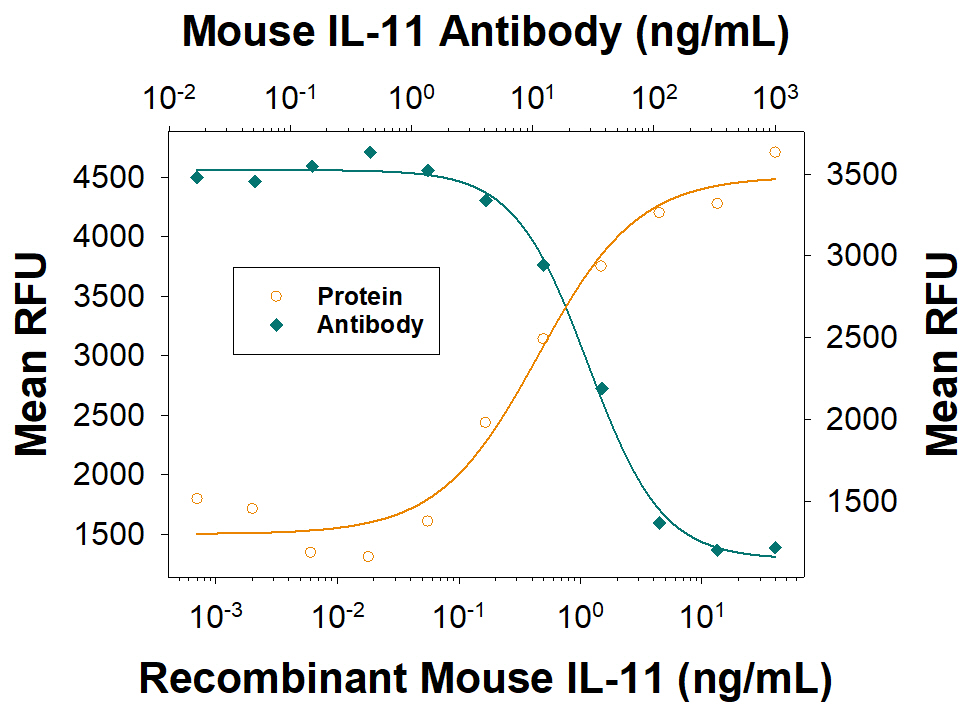Mouse IL-11 Antibody Summary
Gly23-Leu199
Accession # P47873
Applications
Please Note: Optimal dilutions should be determined by each laboratory for each application. General Protocols are available in the Technical Information section on our website.
Scientific Data
 View Larger
View Larger
Cell Proliferation Induced by IL‑11 and Neutralization by Mouse IL‑11 Antibody. Recombinant Mouse IL-11 (418-ML) stimulates proliferation in the T11 mouse plasmacytoma cell line in a dose-dependent manner (orange line). Proliferation elicited by Recombinant Mouse IL-11 (0.75 ng/mL) is neutralized (green line) by increasing concentrations of Mouse IL-11 Antigen Affinity-purified Polyclonal Antibody (Catalog # AF-418-NA). The ND50 is typically 8-50 ng/mL.
Reconstitution Calculator
Preparation and Storage
- 12 months from date of receipt, -20 to -70 °C as supplied.
- 1 month, 2 to 8 °C under sterile conditions after reconstitution.
- 6 months, -20 to -70 °C under sterile conditions after reconstitution.
Background: IL-11
Interleukin-11 is a pleiotropic cytokine that was originally detected in the conditioned medium of an IL-1 alpha -stimulated primate bone marrow stromal cell line (PU-34) as a mitogen for the IL-6-responsive murine plasmacytoma cell line T1165. IL-11 was also independently discovered as an adipogenesis inhibitory factor (AGIF). The mouse IL-11 cDNA encodes a 199 amino acid residue precursor polypeptide with a 22 amino acid residue hydrophobic signal that is processed proteolytically to generate the 177 amino acid residue mature protein. IL-11 contains no cysteine residues or potential glycosylation sites.
IL-11 has multiple effects on both hematopoietic and nonhematopoietic cells. Many of the biological effects described for IL-11 overlap those for IL-6. In vitro, IL-11 can synergize with IL-3, IL-4, and SCF to shorten the G0 period of early hematopoietic progenitors. IL-11 also enhances the IL-3-dependent megakaryocyte colony formation. IL-11 has been found to stimulate the T cell dependent development of specific immunoglobulin-secreting B cells. IL-11, in the presence of IL-3 or SCF, has also been shown to stimulate erythropoiesis. Among nonhematopoietic cell populations, IL-11, like IL-6 and LIF, can stimulate the synthesis of hepatic acute-phase proteins. Consistent with the in vitro functions of IL‑11, in vivo administration of rhIL-11 in normal mice was found to enhance the generation of Ig producing cells and platelets, and to increase the cycling rates of bone marrow-derived CFU-GM, BFU-E, and CFU-GEMM progenitors. IL-11 exerts its biological activities through binding to a specific high-affinity receptor complex consisting of an IL-11 receptor alpha chain and gp130.
Product Datasheets
Citation for Mouse IL-11 Antibody
R&D Systems personnel manually curate a database that contains references using R&D Systems products. The data collected includes not only links to publications in PubMed, but also provides information about sample types, species, and experimental conditions.
1 Citation: Showing 1 - 1
-
The IL-6 family cytokines, interleukin-6, interleukin-11, oncostatin M, and leukemia inhibitory factor, enhance mast cell growth through fibroblast-dependent pathway in mice.
Authors: Gyotoku E, Morita E, Kameyoshi Y, Hiragun T, Yamamoto S, Hide M
Arch. Dermatol. Res., 2001-11-01;293(10):508-14.
Species: Mouse
Sample Types: Whole Cells
Applications: Neutralization
FAQs
No product specific FAQs exist for this product, however you may
View all Antibody FAQsReviews for Mouse IL-11 Antibody
There are currently no reviews for this product. Be the first to review Mouse IL-11 Antibody and earn rewards!
Have you used Mouse IL-11 Antibody?
Submit a review and receive an Amazon gift card.
$25/€18/£15/$25CAN/¥75 Yuan/¥2500 Yen for a review with an image
$10/€7/£6/$10 CAD/¥70 Yuan/¥1110 Yen for a review without an image



